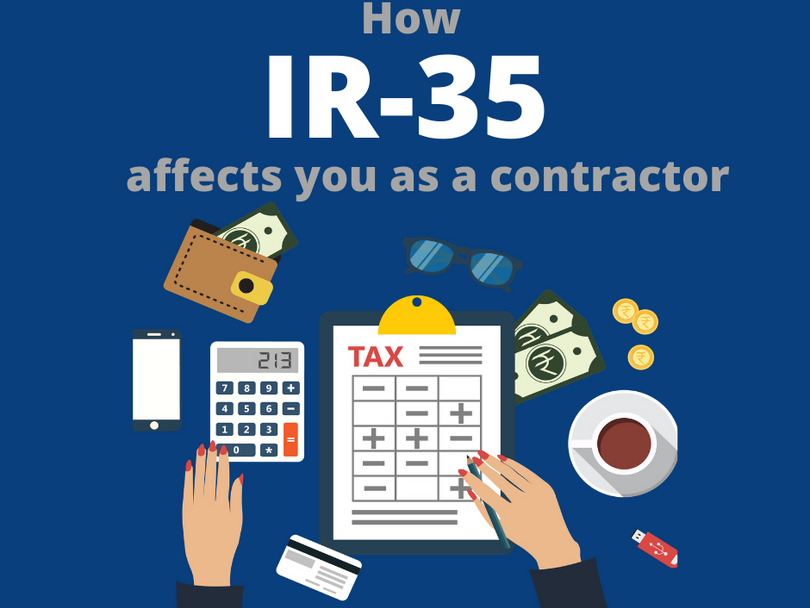Definitions (for the purpose of this article):
Contractor: the individual who is granted work by the employer and operates either as self-employed, through their own limited company or through an agency (in which case, the onus would be on the agency to determine employment status).
Company: the organisation who is acting as the employer and paying for services / expertise from the contractor.
What is IR35?
IR35 is a set of rules that applies to workers who provide their work through an intermediary party. The rules would apply to anyone who is contracting either under an umbrella company (agency) or through their own limited companies.
The rules were essentially introduced in the year 2000 as a mechanism to combat tax avoidance. They are there to ensure that an individual contractor pays the equivalent tax and national insurance contributions as they would do if they were an actual employee, working for the company on their payroll and covering the same position / responsibilities.
As we will discover though, at present, this is very rarely happening.

How do current contractors escape high tax payments?
The way contractors have traditionally set themselves up is to incorporate their own limited company where they are the sole employee. They pay themselves the minimum wage but come the end of the tax year, they take a big dividend payment which consequently incurs much lower tax implications. This is versus receiving the payments monthly and paying normallevels of income tax and National Insurance Contributions (NIC). The latest figures from HMRCshowed that due to this loophole, an extremely low 10% of contractors complied with the current IR35 rules leading to a very urgent calls for reform.

What is the current state of the Construction Industry?
Within the construction industry the use of contractors is very commonplace due to the natureof the work being so highly fragmented and working on contracts that only run for a certain amount of time, such as 12 months to build a new car park or 18 months to build a new housing complex. After this time, the expertise of the individual is no longer needed and so historically this has been a good way for companies to keep staff overheads down and move with any given workload. Equally, the contractor can demand a much higher rate of pay due tonot receiving the usual benefits working for a company permanently provides. Benefits to thecontractor:
- Much higher rate of pay versus a permanent role within a company.
- More flexibility to manage work / life balance.
- Only work when you want or need to.
Benefits to the company:
- Manage its staff overheads based on current workloads.
- Have the flexibility to remove the staff cost without notice.
- Save money on Holiday / Sickness pay, PAYE, NIC, company car, car allowances, company health care, annual wage increases and pensions.
- Obtain expertise of the professional without having to bring the role in-house.
Due to the benefits listed above among others, the popularity and vast number of companies who use contractors, and indeed the number of individuals who choose to supply their services through an intermediary has been continually rising. Consequently, the construction industry has always seen a good balance of supply and demand in this area.
What are the changes?
Previously, the onus has been on the contractors limited company to determine the status of their employment for each individual assignment. The new rules mean that the onus will now be transferred from the contractor / freelancer to the company who actually employs them. If the company is found to be employing a worker through the contracting method and they are not declaring their true rate of pay (rather paying themselves minimum wage and collecting large dividend payments), then the company will face extremely large fines. This will be enforceable for failing to meet a statutory obligation.
It will become the company’s responsibility to determine the employment status of their contractors. If it is deemed that the contractor is treated as a permanent employee (other thanthe fact they are being employed through their own private limited company), then the company is liable to pay all of the fees and tax contributions that they would otherwise need to pay if they employed the individual on a permanent basis on their normal payroll.
Now, determining exact employment status is a notoriously ‘grey’ area and hard thing to do. Aquick search of the court cases surrounding this area show a vast number of separate battles, some with the contractor winning and some with them losing. A great place to start though would be where a business to business transaction (in this instance an employer paying a contractor for his services through an invoice), consists solely of that individuals’ wages and nothing else.

When will the new rules be introduced and enforceable?
The new rules have been enforceable in the public sector (publicly funded organisations) since 6th April 2017.
The new rules were then supposed to be extended to the private sector with and its Medium /Large companies in April 2020 but due to the Covid-19 outbreak the Government has pushed the date of introduction back to 6th April 2021.
It is important to note that the new rules will not affect small companies. The criteria that a company will be assessed on to determine whether they fit into the ‘medium or large’ categories are if the company in question satisfies 2 or more of the below:
- A turnover of more than £10.2million
- A balance sheet total of more than £5.1million
- 49 employees or more
If they do not, they will be broadly determined to be a ‘small’ company.
What affect is this likely to have on the construction industry?
The potential affect that this could have on the construction industry is huge, with ONS figuresshowing that as much as 50% of Construction Industry workers are contracting their services to companies. This alone shows how many people could be affected by the new legislation and equally the companies who employ them with their new responsibilities of determining the individual’s employment status’s. Below is just a brief list of the types of roles and professions within construction that are regularly paid for through contracting:
- Quantity Surveyors
- Project Managers
- Architects
- Design expertise
- Site Agents

It is certainly important to realise that the reform to IR35 makes the legislation more intrusive and will affect the way construction expertise is paid for, with suchlarge fines hanging over any misconduct and the sheer number of professional contractors working in such a way.
Additionally, HMRC reserves the right to investigate any employment case for up
to 6 years after the event.
However, ask yourself the following questions if working in this way is something you want to continue or start to do as a contractor or whether you are the companyemploying them.
Companies:
- Firstly, determine whether your company falls into the ‘small’ or ‘medium and large’ brackets. If you fall into the small bracket and you employ contractors, you do not needto do anything.
- Acknowledge that there will still be individuals who will pursue temporary employment rather than seeking a permanent position on your payroll.
- Offer an increased number of temporary employment contracts for required roles. This way you will not have the commitment of adding someone to your payroll permanently and will still have a fairly high level of flexibility when controlling your staff overheads based on company workload.
- The contractor could work for you as ‘self-employed’ rather than through their limited company and then it may be possible to keep the same rate of pay. However, it could be argued by the HMRC that this is one of permanent employment so the terms must be watertight.
Contractors:
- Does the company you work for supply you with IT and other equipment such as a laptop, printer, and phone?
- Do you work a full-time, 37.5 hours week? And for one company and one company alone?
- Does the work you carry out for that company include a vast array of tasks depending on what their daily or weekly requirements are and/or wants? Or in other words, are the specific tasks that they are employing you for not very clearly defined?
- Do you work for medium or large company and sit with the other full-time employees intheir office and part of their team?
If an individual answered yes to all or some of the above, then under the IR35 rules it is very likely that they could be deemed a permanent employee. And that the individual, and the company they are carrying out work for, would be liable to normal tax contributions If an individual answered no to the questions, then it is likely that they will not fall into the new IR35 rules and are not able to be deemed a permanent employee. Although as mentioned before IR35 is notoriously grey so even if you answered no to all the questions, you may still be deemed as a permanent employee. Disclaimer, We are not providing legal advice in this area. Please seek professional legal advice for more information.
Why not watch our videos on IR-35?





